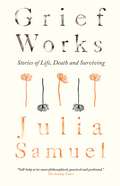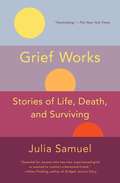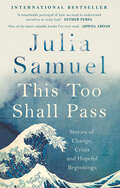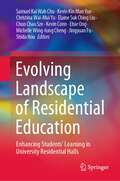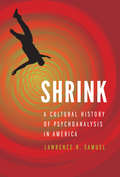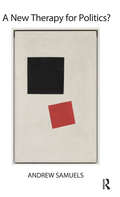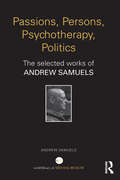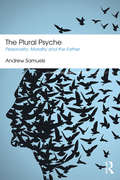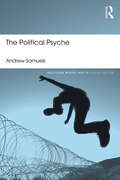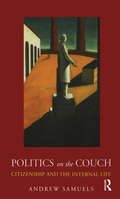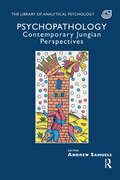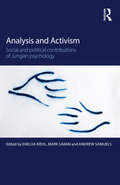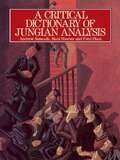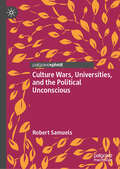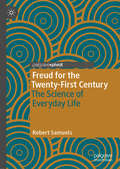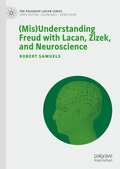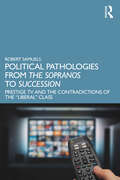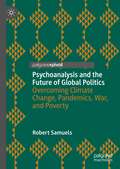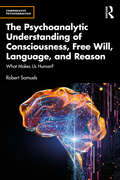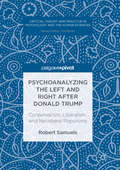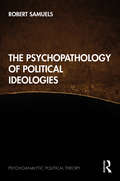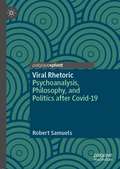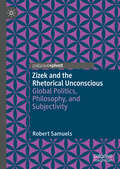- Table View
- List View
Grief Works: Stories of Life, Death and Surviving
by Julia SamuelA warm, moving and practical guide to grief from a leading bereavement counsellor, Grief Works features deeply affecting case studies of the author's clients, which will appeal to readers of Atul Gawande's Being Mortal, Stephen Grosz's The Unexamined Life and Paul Kalanithi's When Breath Becomes Air. <P><P>Death is the last taboo in our society, and grief is still profoundly misunderstood. So many of us feel awkward and uncertain around death, and shy away from talking honestly with family and friends. <P><P>Grief Works is a compassionate guide that will inform and engage anyone who is grieving, from the "expected" death of a parent to the sudden unexpected death of a small child, and provide clear advice for those seeking to comfort the bereaved. <P><P>With deeply moving case studies of real people's stories of loss, and brilliantly accessible and practical advice, Grief Works will be passed down through generations as the definitive guide for anyone who has lost a loved one, and revolutionize the way we talk about life, loss and death.
Grief Works: Stories of Life, Death, and Surviving
by Julia SamuelAn instant bestseller in the UK, Grief Works is a profoundly optimistic and compassionate handbook for anyone suffering a loss—from the expected death of a parent to the sudden death of a child or spouse—as well as a guide for those who want to help their grieving loved ones.Death affects us all. Yet it is still the last taboo in our society, and grief is still profoundly misunderstood. So many of us feel awkward and uncertain around death, and shy away from talking honestly with family and friends. Julia Samuel, a grief psychotherapist, has spent twenty-five years working with the bereaved and understanding the full repercussions of loss. In Grief Works Samuel shares case studies from those who have experienced great love and great loss—and survived. People need to understand that grief is a process that has to be worked through, and Samuel shows if we do the work, we can begin to heal. The stories here explain how grief unmasks our greatest fears, strips away our layers of protection, and reveals our innermost selves. Intimate, clear, warm, and helpful, Grief Works addresses the fear that surrounds death and grief and replaces it with confidence. Samuel is a caring and deeply experienced guide through the shadowy and mutable land of grief, and her book is as invaluable to those who are grieving as it is to those around them. She adroitly unpacks the psychological tangles of grief in a voice that is compassionate, grounded, real, and observant of those in mourning. Divided into case histories grouped by who has died—a partner, a parent, a sibling, a child, as well section dealing with terminal illness and suicide—Grief Works shows us how to live and learn from great loss.
This Too Shall Pass: Stories of Change, Crisis and Hopeful Beginnings
by Julia SamuelA leading therapist shares memorable patient stories to explore the key crises in life and what we can learn from them.If change is the natural order of things, why do so many people struggle with the milestones of life--from first jobs and first loves to children leaving home and retirement?We live in a culture of limitless choice--and life is now more complex than ever. In This Too Shall Pass, acclaimed psychotherapist Julia Samuel draws on hours of conversations with her patients to show how we can learn to adapt and thrive during our most difficult and transformative experiences. Illuminated by the latest social and psychological research, this book unflinchingly deals with the hard times in family, love, work, health and identity.From a woman deciding whether to leave her husband for a younger lover, to a father handling a serious medical diagnosis. And from a new mother struggling with the decision to return to work, to a young man dealing with the aftermath of coming out, and a woman starting over after losing her job.These twenty powerful, unforgettable and deeply intimate stories about everyday people will inform our understanding of our own unique response to change and enlighten the way we approach challenges at every stage of life.
Evolving Landscape of Residential Education: Enhancing Students’ Learning in University Residential Halls
by Samuel Kai Wah Chu Kevin Kin Man Yue Christina Wai-Mui Yu Elaine Suk Ching Liu Chun Chau Sze Kevin Conn Elsie Ong Michelle Wing-tung Cheng Jingyuan Fu Shida HouThis book examines the alignment of residential educational aims and university educational aims in order to provide guidance for implementing university-specific residential educational aims. Grounded in a new theoretical model of residential education, Residential Education in university probes into how university students adopt transformative learning through residential halls in different universities. By reviewing case studies, experience sharing, and residential hall models in renowned universities in Asia, U.K., and USA respectively, this book offers a wide perspective to assess different residential education models in practice and useful programs to promote students learning outcomes. The detailed discussion on how to create learning environments and align educational aims of residence and university to maximize learning outcomes in different cultural contexts provides readers with insight into how the residential experience in university can be improved.
Shrink: A Cultural History of Psychoanalysis in America
by Lawrence R. Samuel&“Psychology has stepped down from the university chair into the marketplace&” was how the New York Times put it in 1926. Another commentator in 1929 was more biting. Psychoanalysis, he said, had over a generation, &“converted the human scene into a neurotic.&” Freud first used the word around 1895, and by the 1920s psychoanalysis was a phenomenon to be reckoned with in the United States. How it gained such purchase, taking hold in virtually every aspect of American culture, is the story Lawrence R. Samuel tells in Shrink, the first comprehensive popular history of psychoanalysis in America.Arriving on the scene at around the same time as the modern idea of the self, psychoanalysis has both shaped and reflected the ascent of individualism in American society. Samuel traces its path from the theories of Freud and Jung to the innermost reaches of our current me-based, narcissistic culture. Along the way he shows how the arbiters of culture, high and low, from public intellectuals, novelists, and filmmakers to Good Housekeeping and the Cosmo girl, mediated or embraced psychoanalysis (or some version of it), until it could be legitimately viewed as an integral feature of American consciousness.
A New Therapy for Politics?
by Andrew SamuelsAndrew Samuels has established an international practice as a political consultant, working with senior politicians, political parties and activist groups. His lectures and workshops on the application of 'therapy thinking' to social and political issues attract wide interest. His previous books in this area, such as The Political Psyche and Politics on the Couch, have been widely appreciated. Now, in a long-anticipated tour-de-force that is both compassionate and intellectually stimulating, this book deepens in a new and innovate style his engagement with themes such as economics, ecopsychology, leadership, aggression and violence, the role of the individual in progressive politics, and sexuality and spirituality in political contexts. The reader is encouraged to move beyond conventional professional or academic discourse by the inclusion of experiential exercises in the text. In this way, activism and analysis, public and private, therapeutic and more-than-personal are all brought together in a satisfying yet challenging synthesis.
Passions, Persons, Psychotherapy, Politics: The selected works of Andrew Samuels (World Library of Mental Health)
by Andrew SamuelsAndrew Samuels is one of the best known figures internationally in the fields of psychotherapy, Jungian analysis, relational psychoanalysis and counselling, and in academic studies in those areas. His work is a blend of the provocative and original together with the reliable and scholarly. His many books and papers figure prominently on reading lists in clinical and academic teaching contexts. This self-selected collection, Passions, Persons, Psychotherapy, Politics, brings together some of Samuels' major writings at the interface of politics and therapy thinking. In this volume, he includes chapters on the market economy; prospects for eco-psychology and environmentalism; the role of the political Trickster, particularly the female Trickster; the father; relations between women and men; and his celebrated and radical critique of the Jungian idea of ‘the feminine principle’. Clinical material consists of his work with parents and on the therapy relationship. The book concludes with his seminal and transparent work on Jung and anti-semitism and an intriguing account of the current trajectory of the Jungian field. Samuels has written a highly personal and confessional introduction to the book. Each chapter also has its own topical introduction, written in a clear and informal style. There is also much that will challenge the long-held beliefs of many working in politics and in the social sciences. This unique collection of papers will be of interest to psychotherapists, Jungian analysts, psychoanalysts and counsellors – as well as those undertaking academic work in those areas.
The Plural Psyche: Personality, Morality and the Father (Routledge Mental Health Classic Editions)
by Andrew SamuelsPluralism can bridge the gaps that have opened up between personal experience, psychotherapy, and cultural criticism. In The Plural Psyche: Personality, Morality and the Father, a provocative, much praised and widely discussed book, Andrew Samuels lays bare the political implications of the personal struggle everyone has to hold their many inner divisions together. He also shows how pluralism can inspire new thinking in many areas including moral process, the construction of gender, and the role of the father in the development of sons and daughters. In addition, there are innovative chapters on clinical work, focusing on imagery and on countertransference. These themes come to life in a way that makes a significant contribution to debates about psychotherapy, gender, parenting and difference. This Classic Edition of The Plural Psyche includes a new introduction by the author.
The Political Psyche (Routledge Mental Health Classic Editions)
by Andrew SamuelsWhat can depth psychology and politics offer each other? In The Political Psyche Andrew Samuels shows how the inner journey of analysis and psychotherapy and the passionate political convictions of the outer world are linked. He brings an acute psychological perspective to bear on public themes such as the market economy, environmentalism, nationalism, and anti-Semitism. But, true to his aim of setting in motion a two-way process between depth psychology and politics, he also lays bare the hidden politics of the father, the male body, and of men's issues generally. A special feature of the book is an international survey into what analysts and psychotherapists do when their patients/clients bring overtly political material into the clinical setting. The results, including what the respondents reveal about their own political attitudes, destabilize any preconceived notions about the political sensitivity of analysis and psychotherapy. This Classic Edition of the book includes a new introduction by Andrew Samuels.
Politics on the Couch: Citizenship and the Internal Life
by Andrew SamuelsThis is an accessible, lucid and stimulating account of the hidden psychology of politics and the hidden politics of the psyche. It is packed with original and imaginative ideas on economics, nationalism, "good-enough" leadership, the citizen and the state, women and men, fatherhood, and the citizen as a "therapist of the world". The author offers trenchant and timely critiques of the crisis in contemporary politics. The book will be important for politicians, people in management studies and the media, members of the therapy world, and all political activists.
Psychopathology: Contemporary Jungian Perspectives (The\library Of Analytical Psychology Ser.)
by Andrew SamuelsThe latest addition to the Library of Analytical Psychology is an outstanding collection of papers written by Jungian analysts from different schools of analytical psychology on various aspects of psychopathology. The subjects covered include depression, anorexia, schizoid personality, narcissistic personality disorder, mania, psychosis, paranoia, masochism, fetishism, transvestism, perversion, marital dysfunction, survivor syndrome, and old age. The book is intended to appeal beyond the Jungian community, and the editor’s introductory remarks which precede each paper highlight (and where necessary explain) concepts and attitudes which seem special to analytical psychology. In this way, as with Andrew Samuels’ previous edited volume The Father: Contemporary Jungian Perspectives, psychoanalytically and eclectically orientated practitioners can make full use of this book. The papers in this volume contain a wealth of clinical knowledge – pragmatic, flexible, disposable, but above all rooted in what actually happens in analysis.
Analysis and Activism: Social and Political Contributions of Jungian Psychology
by Andrew Samuels Emilija Kiehl Mark SabanJungian psychology has taken a noticeable political turn in the recent years, and analysts and academics whose work draws on Jung’s ideas have made internationally recognised contributions in many humanitarian, communal and political contexts. This book brings together a multidisciplinary and international selection of contributors, all of whom have track records as activists, to discuss some of the most compelling issues in contemporary politics. Analysis and Activism is presented in six parts: Section One, Interventions, includes discussion of what working outside the consulting room means, and descriptions of work with displaced children in Colombia, projects for migrants in Italy and of an analyst’s engagement in the struggles of indigenous Australians. Section Two, Equalities and Inequalities, tackles topics ranging from the collapse of care systems in the UK to working with victims of torture. Section Three, Politics and Modernity, looks at the struggles of native people in Guatemala and Canada and oral history interviews with members of the Chinese/Vietnamese diaspora. Section Four, Culture and Identity, studies issues of race and class in Brazil, feminism and the gendered imagination, and the introduction of Obamacare in the USA. Section Five, Cultural Phantoms, examines the continuing trauma of the Cultural Revolution in China, Jung’s relationship with Jews and Judaism, and German-Jewish dynamics. Finally, Section Six, Nature: Truth and Reconciliation, looks at our broken connection to nature, town and country planning, and relief work after the 2011 earthquake in Japan. There remains throughout the book an acknowledgement that the project of thinking forward the political in Jungian psychology can be problematic, given Jung’s own questionable political history. What emerges is a radical and progressive Jungian approach to politics informed by the spirit of the times as well as by the spirit of the depths. This cutting-edge collection will be essential reading for Jungian and post-Jungian academics and analysts, psychotherapists, counsellors and psychologists, and academics and students of politics, sociology, psychosocial studies and cultural studies.
A Critical Dictionary of Jungian Analysis
by Andrew Samuels Bani Shorter Fred PlautThe language of Jung's writings, and of analytical psychology generally, is sometimes difficult to understand. This guide, in dictionary format, combines scholarship and historical accuracy with a stimulating, critical attitude.
Between Philosophy and Psychoanalysis: Lacan's Reconstruction of Freud
by Robert SamuelsFirst published in 1993. Routledge is an imprint of Taylor & Francis, an informa company.
Culture Wars, Universities, and the Political Unconscious
by Robert SamuelsThis book argues that whenever we are talking about cancel culture, identity politics, political correctness, antisemitism, conspiracy theories, or the alt-Right, we are dealing with a culture war, which often pits two sides against each other in a split world of good and evil. These political representations rely on a set of unconscious processes best understand through psychoanalysis. As this book argues, if you want to comprehend the rhetoric of the Right, the Left, conservatives, and centrists, it is necessary to see how these ideologies rely on unacknowledged defense mechanisms, fantasies, fears, and desires. In fact, if we do not employ psychoanalytic concepts to examine our political investments, we will be unable to get to the root causes driving these social productions. Each chapter of this book looks at a specific writer‘s or politician’s take on contemporary culture wars. One of the reoccurring themes concerns the way free speech has been weaponized by different ideological formations, and this battle over free expression is often centered on the role that universities play in balancing the demands among competing social interests. This book will not only clarify what universities should be, but it will also help us to move beyond our polarized political world.
Freud for the Twenty-First Century: The Science of Everyday Life
by Robert SamuelsThis book places Freud’s theory of the reality principle in relation to both everyday experience and global issues of the 21st century and illustrates how it may be practically applied. Arguing against more critical recent accounts of Freud’s science, the author seeks to show how one might apply the scientific method to everyday life. It demonstrates how Freud contributes to a better understanding of reason and how this in turn can be used to unravel the role of unreason in both politics and personal relationships. Including critical examinations of topics such as Narcissism, Victimhood and Empathy, this engaging reappraisal of Freud’s relevance to contemporary life offers fresh insights for psychology, psychoanalysis and cultural theory; as well as practical guidance for a general reader.
**Missing** (The Palgrave Lacan Series)
by Robert SamuelsThis book sets out to clarify five key Freudian concepts (the pleasure principle, the primary processes, the unconscious, transference, and the reality principle) elaborated early on in Freud’s work but, it is argued, rarely understood—even by psychoanalysts themselves. It examines in turn the post-Freudian paradigms employed in neuropsychoanalysis, Lacan, Zizek, object relations, and psychoanalytic approaches to identity politics, and in doing so reveals the extent to which they have been distorted and repressed in these new contexts. Over the course of the book the author demonstrates how Freud’s unpublished Project for a Scientific Psychology can be seen as a complete system of core concepts that both ground psychoanalysis in neurology and also introduce a vital challenge to the brain sciences. This book will appeal to students and scholars of psychoanalysis, clinical psychology, and psychoanalytic theory.
Political Pathologies from The Sopranos to Succession: Prestige TV and the Contradictions of the “Liberal” Class
by Robert SamuelsPolitical Pathologies from The Sopranos to Succession argues that highly praised prestige TV shows reveal the underlying fantasies and contradictions of uppermiddle-class political centrists. Through a psychoanalytic interpretation of The Sopranos, Breaking Bad, The Wire, House of Cards, Dexter, Game of Thrones, and Succession, Robert Samuels uncovers how moderate “liberals” have helped to produce and maintain the libertarian Right. Samuels’ analysis explores the difference between contemporary centrists and the foundations of liberal democracy, exposing the myth of the “liberal media” and considers the consequences of these celebrated series, including the undermining of trust in modern liberal democratic institutions. Political Pathologies from The Sopranos to Succession contributes to a greater understanding of the ways media and political ideology can circulate on a global level through the psychopathology of class consciousness. This book will be of great interest to academics and scholars considering intersections of psychoanalytic studies, television studies, and politics.
Psychoanalysis and the Future of Global Politics: Overcoming Climate Change, Pandemics, War, and Poverty
by Robert SamuelsThis book offers a unique approach by using psychoanalytic theory to explain how we can resolve the most important issues facing the world today and in the future. One of my main arguments is that we need to move beyond national politics in order to provide global solutions to global problems. However, there is a misplaced fear concerning global governance, and much of this phobia is derived from a misunderstanding of history and human psychology. Not only do we have to learn to give up our idealized investment in nations and nationalism, but we also have to move beyond seeing the world from the perspective of a victim fantasy. Since we often repress real signs of global progress, we experience the global present and the future in negative ways. To reverse this perspective, we need to first understand the incredible progress humans have made in the last two hundred years, but we also should not ignore the real threats we face.
The Psychoanalytic Understanding of Consciousness, Free Will, Language, and Reason: What Makes Us Human? (Comparative Psychoanalysis)
by Robert SamuelsThe Psychoanalytic Understanding of Consciousness, Free Will, Language, and Reason examines the ways in which we can use psychoanalysis in order to better understand humanity and explores the question of what makes us human. For thousands of years, thinkers have been trying to define what makes us human. Some of the main questions they have asked is: What is consciousness? Do we have free will? Do animals use language? And what does reason mean? Samuels argues that we need to better understand the psychoanalytic approach to human nature in order to answer these questions, as well as using it to provide a new way of understanding issues such as addiction, political conflict, ideology, and destructive personal relationship. This book will be of vital interest to psychotherapists, as well as students and researchers across the fields of psychoanalysis, philosophy, and psychology.
Psychoanalyzing the Left and Right after Donald Trump
by Robert SamuelsThis book outlines a new model for global social justice movements that is based on Freud and Lacan's central insights regarding the unconscious, repetition, drives, and transference. Since most of our current social issues are global in nature, Bob Samuels convincingly argues that we need a global solution, but that global solidarity is blocked by narcissistic nationalism and the capitalist death drive. In examining contemporary social movements for global justice, Samuels articulates a comprehensive theory of non-pathological social solidarity, and argues that in the age of multinational corporations and global climate change, we need a new model of global justice and government that requires an understanding of analytic neutrality and free association. This book uses psychoanalytic theories and practices to explain how someone like Trump can rise to power, and explores why liberals have failed to provide a convincing or effective political alternative. It will be compelling reading to students and teachers in a range of psychological and political disciplines, and to anyone interested in psychoanalysis and current politics.
The Psychopathology of Political Ideologies (Psychoanalytic Political Theory)
by Robert SamuelsInspired by Freud’s The Psychopathology of Everyday Life, this book examines the unconscious processes shaping contemporary political ideologies. Addressing ten fundamental questions, Robert Samuels identifies four basic political ideologies: liberal, conservative, Left, and Right, which are often placed in the structure of a logical square, determined by two binary oppositions, with a fifth structure of centrism complicating the square. He turns to psychoanalysis to explain the unconscious defense mechanisms that structure these political ideologies. Each chapter uses a recent, influential title as a gateway to the analysis of the ideologies and structures identified. Through this analysis, Samuels argues that belief in ideological structures is tied to triumvirates of institutions and ideals; conservatives being tied to premodern institutions of religion, feudalism, and monarchy, while modern liberals are tied to ideals of universality, objectivity, and empiricism. He concludes that this investment in universality shapes the ethics of modern globalization and democratic liberalism. Unlike other books, conclusions are reinforced through examples drawn from current events with an integrated model of different psychopathologies. The Psychopathology of Political Ideologies moves beyond providing an understanding of what drives different political investments, to offer a more rational and conscious comprehension of subjectivity and social organization. This book will be a great resource for those interested in politics, political science psychology, social psychology, globalization, and ideology.
The Psychopathology of Political Ideologies (Psychoanalytic Political Theory)
by Robert SamuelsInspired by Freud’s The Psychopathology of Everyday Life, this book examines the unconscious processes shaping contemporary political ideologies.Addressing ten fundamental questions, Robert Samuels identifies four basic political ideologies: liberal, conservative, Left, and Right, which are often placed in the structure of a logical square, determined by two binary oppositions, with a fifth structure of centrism complicating the square. He turns to psychoanalysis to explain the unconscious defense mechanisms that structure these political ideologies. Each chapter uses a recent, influential title as a gateway to the analysis of the ideologies and structures identified. Through this analysis, Samuels argues that belief in ideological structures is tied to triumvirates of institutions and ideals; conservatives being tied to premodern institutions of religion, feudalism, and monarchy, while modern liberals are tied to ideals of universality, objectivity, and empiricism. He concludes that this investment in universality shapes the ethics of modern globalization and democratic liberalism. Unlike other books, conclusions are reinforced through examples drawn from current events with an integrated model of different psychopathologies.The Psychopathology of Political Ideologies moves beyond providing an understanding of what drives different political investments, to offer a more rational and conscious comprehension of subjectivity and social organization. This book will be a great resource for those interested in politics, political science psychology, social psychology, globalization, and ideology.
Viral Rhetoric: Psychoanalysis, Philosophy, and Politics after Covid-19
by Robert SamuelsThis book looks at the representation of viruses in rhetoric, politics, and popular culture. In utilizing Jean Baudrillard’s concept of virality, it examines what it means to use viruses as a metaphor. For instance, what is the effect of saying that a video has gone viral? Does this use of biology to explain culture mean that our societies are determined by biological forces? Moreover, does the rhetoric of viral culture display a fundamental insensitivity towards people who are actually suffering from viruses? A key defining aspect of this mode of persuasion is the notion that due to the open nature of our social and cerebral networks, we are prone to being infected by uncontrollable external forces. Drawing from the work of Freud, Lacan, Laclau, Baudrillard, and Zizek, it examines the representation of viruses in politics, psychology, media studies, and medical discourse. The book will help readers understand the potentially destructive nature of how viruses are represented in popular media and politics, how this can contribute to conspiracy theories around COVID-19 and how to combat such misinterpretations.
Zizek and the Rhetorical Unconscious: Global Politics, Philosophy, and Subjectivity
by Robert SamuelsThis book builds on a critique of Slavoj Zizek’s work to outline a new theory of psychoanalytic rhetoric. It turns to Zizek because not only is he one of the most popular intellectuals in the world, but, this book argues, his discourse is shaped by a set of unconscious rhetorical processes that also determine much of contemporary politics, culture, and subjectivity. Just as Aristotle argued that the three main forms of persuasion are logos (reason), pathos (emotion), and ethos (authority), Samuels describes each one of these aspects of communication as related to a fundamental psychoanalytic concept. He also turns to Aristotle’s work on theater to introduce a fourth form of rhetoric, catharsis, which is the purging of feelings of fear and pity. Adding a strong voice to current psychoanalytic debate, this book will be of value to all scholars and students interested in both the history and modern developments of psychoanalytic theory.
